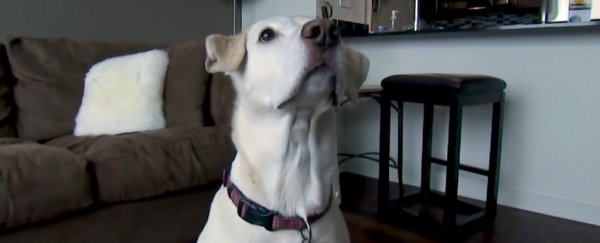A journalist working for NBC 5 in the US has road-tested a handful of mail-order DNA analysis services, only to find they all gave conflicting results.
On top of that, one of the companies couldn't even recognise the difference between human DNA and that of a dog named Bailey. According to their report, Bailey is genetically well suited to playing basketball and long distance cycling.
Reporter Phil Rogers (and his faithful pooch) conducted their n=2 trial as part of a recent NBC5 Investigates segment, randomly purchasing a bunch of test kits and sending back the required biological samples for a readout.
Results were diverse, to say the least. Based on the feedback, Roger could confidently gamble that his ancestors came from the northern parts of the UK. Or perhaps Western Europe. Maybe Scandinavia? It really depended on which kit he used.
To add to the confusion, a third service concluded his genetic markers matched populations in Kuwait, Ireland, Austria, and Afghanistan, with a slightly lower chance of matches in Peru and Guyana.
As for Bailey, since most of the kits admitted they couldn't decipher the dog's genetic material, we have no idea what this golden retriever's pedigree is.
But at least we know what sports she'd excel at. According to a seven-page report from the US$29 "Superhero" service offered by Orig3n DNA, Bailey's genes promise a muscle force that would suit her to quick movements: perfect for boxing and playing basketball.
She was also reported to have genes associated with a heart that was well suited to long distance events like cycling and running.
According to Rogers' report, Orig3n DNA hadn't yet responded to questions. Without knowing the exact details of what was being analysed, we shouldn't be overly critical.
We wouldn't say this trial-by-reporter amounts to a robust clinical evaluation of these services, and it's not even an entirely new idea. But the NBC 5 segment does draw attention to the question of what consumers should expect from this emerging field of technology.
We've all seen the advertisements – for up to a couple hundred dollars you can discover anything from your ancestral ethnicity and genealogy to health risks and genetic fitness in various fields.
At least, that's the sales pitch.
Apparently we can't get enough of them, with more than 12 million people purchasing these services worldwide. The 23andMe DNA test kit was among the top five items sold on Amazon during the 2017 Black Friday sale.
The fundamental science behind the process seems solid enough – lowering costs and increasing speeds in DNA sequencing technology now makes it affordable for the average Joe to have key sections of their genetic code deciphered with relative accuracy.
But while reading bases in a strand of DNA is one thing, making sense of those codes is another - and this is where it's still early days for genetic screening.
Determining ancestry, for example, relies on having a sizeable database of markers taken from populations across the globe; some services do claim to have this.
"One of Ancestry's accuracy advantages comes from combining the world's largest DNA network of more than 7 million people with more than 10 billion historical records, and 100 million family trees," the company Ancestry told Rogers in a statement.
Those sound like big numbers, but reliability would also demand the right algorithms to turn data into meaningful statistics. How much trust we should place in those services, especially in absence of regulatory bodies, leaves plenty of room for debate.
For the most part, it's tempting to dismiss quick-and-easy DNA testing as harmless fun.
But in cases where individuals are seeking information for important health decisions, from determining their diet to estimating chances of developing cancer, cheap genetic interpretation services could be dangerously misleading.
Improvements in DNA sequencing technology in recent decades have undoubtedly revolutionised genealogy and medicine. Meanwhile, market regulations, data security, and general knowledge on the topic are slow to catch up.
In the future, home DNA testing kits could well play a central role in in the healthcare revolution we hope for.
Unless Bailey happens to win this year's Tour de France, for the time being we should probably take these DIY DNA screens with a grain of salt.
